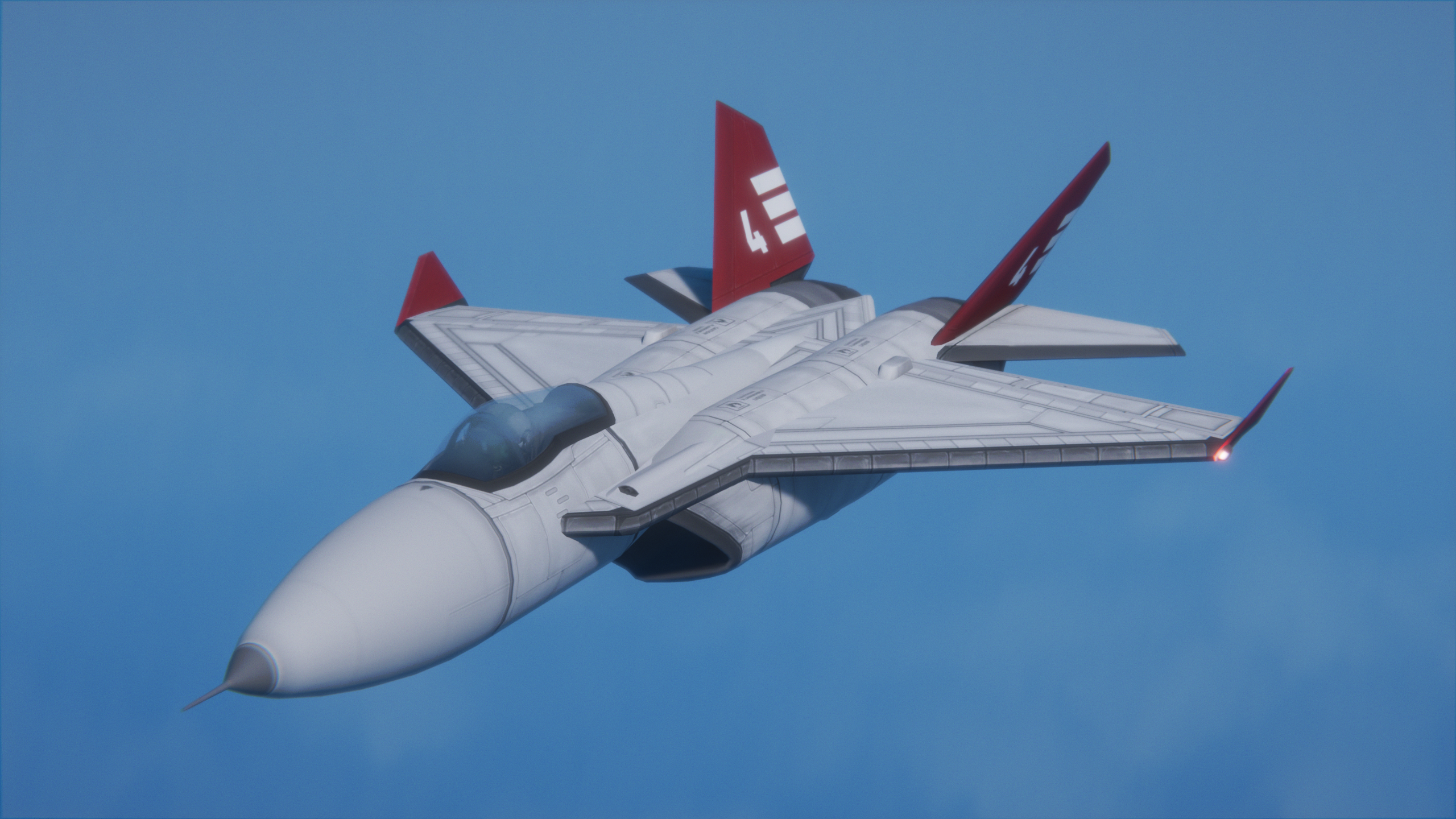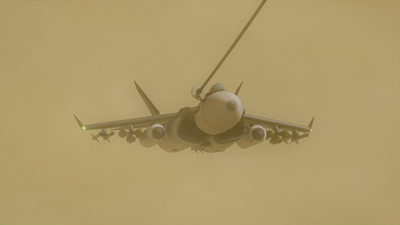F-77 Shrike: Difference between revisions
mNo edit summary |
|||
| Line 2: | Line 2: | ||
{{Craft |
{{Craft |
||
|name = F-77 Shrike |
|name = F-77 Shrike |
||
| − | |full_name = |
+ | |full_name = |
|image = F-77 Shrike.png|imagedesc = A Block 95 F-77 Shrike (A035-71) from the 53rd Tactical Fighter Squadron “Ronin” (TF-53) in flight. This airframe was one of the few to be converted from the original Block 5 model all the way to the final Block 95 specification. |
|image = F-77 Shrike.png|imagedesc = A Block 95 F-77 Shrike (A035-71) from the 53rd Tactical Fighter Squadron “Ronin” (TF-53) in flight. This airframe was one of the few to be converted from the original Block 5 model all the way to the final Block 95 specification. |
||
|type=Air superiority fighter |
|type=Air superiority fighter |
||
Revision as of 01:13, 26 October 2022
|
F-77 Shrike
|
|||||
|---|---|---|---|---|---|
| Air superiority fighter | |||||
 |
|||||
| A Block 95 F-77 Shrike (A035-71) from the 53rd Tactical Fighter Squadron “Ronin” (TF-53) in flight. This airframe was one of the few to be converted from the original Block 5 model all the way to the final Block 95 specification. | |||||
| National Origin | Aquaria | ||||
| Production History | |||||
| Designed | |||||
| [date] - [date] | |||||
| Produced | |||||
| [date] - [date] | |||||
| Designer | Sparrow Aeronautics | ||||
| Unit Cost | [funds cost](√) | ||||
| Number Built | 203 | ||||
| Service History | |||||
| In Service | |||||
| [date] - [date] | |||||
| Used By | Republic of Aquaria | ||||
| Aircraft Characteristics | |||||
| Dry Mass | [mass] | ||||
| Length | [length] m | ||||
| Width | [width] m | ||||
| Height | [height w/gear retracted] m | ||||
| Propulsion | [engine types and quantity] | ||||
| Operational Range | [range in km] km | ||||
| Crew | 1 | ||||
| Sensor Systems | [sensor types] | ||||
| Armament | [ship based arms] | ||||
| Variants | [aircraft variant names] | ||||
The Sparrow Aeronautics F-77 Shrike is a family of 5th generation, single seat, twin engine, all weather air superiority craft developed for the Aquarian Air Force. Commissioned to replace the aging F-50, the first variants of the Shrike came into service at the start of a new decade when the 2070s began, and still serves well into the 2080s, the much upgraded airframe still the same recognisable workhorse of the AQAF. Due to numerous technologies not found in other Aquarian aircraft, the plane has a total export ban in effect.

Development
Design
The Shrike has a tailed compound delta wing structure with canted wingtips, to maximise manueverability at both high and low speeds. A pair of vertical stabilisers provide yaw control, at the same angle as the wingtips to reduce radar signature. It is powered by a pair of Corain Motors J304 Afterburning Turbofan jet engines, providing up to approximately 85kn of thrust each in dry mode and 135kn in wet mode. They are fed by two adjustable ramp intakes mounted underneath wing strakes, next to the cockpit. Weapons are stored on pylons on the wings, with up to 6 hardpoints compatible with all types of aircraft mounted missiles and bombs. It features one of the largest fighter cockpits on Kerbin, it’s all glass construction giving the pilot excellent visibility.
Variants
The Shrike has many variants and upgrades, allowing it to remain at the cutting edge of modern technologies decades after coming into service. The most significant alteration to the airframe was the Block 50 upgrade, which was rolled out over the course of months and required a near complete rebuild with hundreds of new components. This streamlined and lengthened the fuselage and cockpit, adjusted the flight surfaces, and increased the range and battery capacity. Though it was costly and greatly decreased the AQAF’s readiness when it was being carried out, the end result was an aircraft miles ahead of its predecessor. These planes continued to receive minor upgrades through the years afterwards and are still flying will into the late 2080s.
Block 5
The original, baseline planes that first rolled out of the factory in 2070, the Block 5 looks very different to the Shrikes of today, and were not nearly as refined.
Block 50
By far the largest change between iterations, the Block 50 upgrade was rolled out over the course of months and required a near complete rebuild with hundreds of new components. This streamlined and lengthened the fuselage and cockpit, adjusted the flight surfaces, and increased the range and battery capacity. Though it was costly and greatly decreased the AQAF’s readiness when it was being carried out, the end result was an aircraft miles ahead of its predecessor. The general shape is very similar to a modern Shrike, the key differences being the intake shape and shorter LEX.
Block 60
The Block 60 improved on the 50 by lengthening the Leading Edge Extensions, resulting in increased agility at many speeds. It also came with slight avionics and software improvements.
Block 65
The Block 65 featured reshaped intakes, decreasing frontal RCS significantly and improving air flow at high speeds. It also introduced the CSPW, or Central Special Weapon, hardpoint. This allowed the Shrike to mount systems such as small railguns and fixed lasers.
Block 70
The Block 70 was produced after simulations with contemporary aircraft showed the FCS struggling to handle the turns at high G necessary, something which hadn’t been encountered to the same degree in the Sarconian Counterinsurgency. The upgrade was rolled out with a completely reworked next generation avionics and flight computer, flight surface self repair software, and a greatly modernised holographic and digital cockpit. The flight helmet was also reworked to increase situational awareness and streamline the HUD.
Block 80
The Block 80 brings a large visual change through a rework of the Shrike’s Leading Edge Wing Extensions, in a setup that increases manuverability, visibility, and ease of access to the cockpit. It also replaces the ageing radar with a new and more powerful version.
